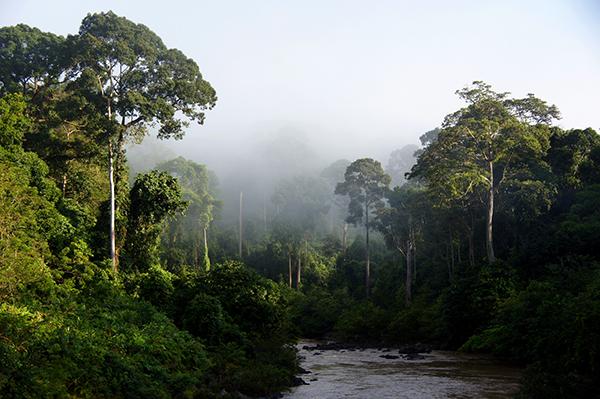
Credit: Jedediah Brodie
MISSOULA – Jedediah Brodie has spent a career tromping around tropical rainforests, conducting on-the-ground research in some of the world’s most lush and diverse regions.
An ecologist and conservation biologist, Brodie has spent the past 20 years working with nonprofits and state governments in Malaysian Borneo in the South China Sea to conserve land, wildlife and plant species. His work buoys species protection, tourism and environmental longevity for the region.
Now, the University of Montana associate professor in UM’s Division of Biological Sciences has published a paper detailing a major conservation success in the Malaysian state of Sabah, where Brodie and a team of scientists worked to increase Sabah’s rainforest protection. Co-authors include UM Postdoctoral Researcher Sara Williams and a cohort of international scientists.
The State of Sabah recently committed to increasing conserved areas by almost a million acres, a move that bucks the international trend of tropical deforestation and climate change devastation. State officials contracted Brodie and colleagues to identify the best places for new protected areas that would most effectively conserve biodiversity and maintain forest carbon. Their study compared different possibilities for the creation of new national parks and conservation forests, increasing the protected area of an island renowned for its rainforests and diverse wildlife.
“This project was motivating because the end result is a direct, positive impact,” Brodie said. “Some call conservation biology a profession of depression because so many species and ecosystems are declining, but the situation in Sabah makes me optimistic – they’re leading the way in conserving rainforests.”
The study compared different possibilities for the creation of new national parks and conservation forests.
The study “Incorporating Connectivity Into Conservation Planning for Optimal Representation of Multiple Species and Ecosystem Services” was published in the journal Conservation Biology.
The article shares how Brodie and colleagues in Malaysia and the United Kingdom employed strategies of reserve design, using data on wildlife habitat corridors, animal, and plant species ranges and forest carbon storage, in order to best protect biodiversity and landscape connectivity.
“The challenge was looking at this huge landscape and trying to connect and protect the little dots like the range needed for mammals, birds, butterflies and plants,” he said. “The connectivity of the parks was essential because it’s fine to protect species where they currently are, but they move to different areas in response to climate change.”
Brodie said the protected areas will help conserve iconic, threatened species in the region, including the Bornean Orangutan, Hornbills and the Clouded Leopard – an apex predator in the region that is vulnerable to extinction. Many of the plant and butterfly species that will be protected are found nowhere else in the world.
The Sabah Forestry Department is formulating the study’s recommendation for new conservation areas into legislation that the State Assembly will vote on.
###
At UM, Brodie is the Craighead Endowed Chair of Conservation, where he teaches and researches in the University’s Wildlife Biology Program. In 2016, UM’s Wildlife Biology Program was ranked No.1 in the U.S. and Canada by Academic Analytics, citing UM’s unrivaled access to hands-on, outdoor learning and research opportunities and faculty productivity.
The paper was authored by Brodie and colleagues Agnes Agama and Glen Reynolds, co-directors of the Southeast Asian Rainforest Research Partnership; Professor David Burslem from the University of Aberdeen; and University of York Professors Jane Hill and Sarah Scriven.
Media Contact
Jedediah Brodie
[email protected]
406-880-3854
Original Source
http://news.
Related Journal Article
http://dx.




